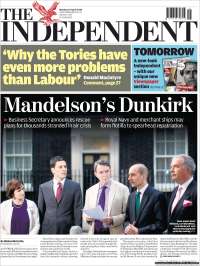
Europe is being over-run by credit rating agencies like Standard and Poor’s, Fitch, Moody’s et al, who on long legs are walking over our lives. The Financial Times has just broken the news that Standard and Poor’s have downgraded Spain’s credit rating from AA+, which was ok, one imagines, to AA, which is less. This comes just after the same prophetically named organisation (I set Standards, you’re Poor) docked Portugal from an A+ to A-. Not even the end of April, and the nightmare of the worst end of term school report went to Greece. Only yesterday, S&B looked at the Hellenic nation’s smudged copy books with too many crow's nests and dog-eared corners, tutted and scratched “BB+” with big red pen. Meanwhile, my own native home, Ireland, fears “contagion.”
The press of course drools over the dispatches, and having looked deep into its conscience, says it's six o'clock and time to roll over. The euro has “dived”, because "market sentiment” is “contaminated”, oil prices are “shaken”, investors have “fears”. Firstly, what is utterly mind-boggling is that abstract entities such as markets and prices and currencies are attributed human emotions. The thrust of such misuse of adjectives is to suggest that they are victims of something i.e. victims of Portugal, Ireland, Greece and Spain, who go under the cheerful acronym of PIGS. Secondly, when we speak of investors (but can we now say that this word is in any way related to the root verb – investire - "to clothe in, cover, surround"?), we depict them as beaten kittens rather than cool-headed, quick-thinkers out for financial opportunity. A vocabulary has been developed that first of all does not describe these events as those enacted by real people, but of abstract nouns that behave like people. The idea that our economic life is governed by an agency as arbitrary as clouds is obscene. We are not so stupid as to forget that today like any other day, fearful banks and trembling institutionals accumulated wealth.
The problem is that a history of this economic crisis is written daily describing a reality that suits the leading actors. Who hold nations consisting of sprightly, sluggardly, careful, cancerous, bold and balding citizens to account for financial dealings they have had no say in. Paradoxically even these major actors to the drama seem unable to grasp the situation adequately, if only to themselves. Take OECD secretary general Angel Gurria. “This is Ebola,” he gushed. “When you realise you have it you have to cut your leg off in order to survive.” Forgive me if I’m wrong but I remember Ebola as a disease of the nineties where your skin sort of fell off in clumps like in a zombie flick and was supposed to wipe us all out, but didn’t. Surely if one legged Gurria wants to compare the Eurozone crisis to a disease whose threat was hysterically exaggerated, given that it’s all down to PIGS, he should have evoked swine flu. But perhaps a swine flu analogy wouldn’t scare us enough to gulp down the snake oil of bone-crunching austerity that is now, apparently, the only cure.








